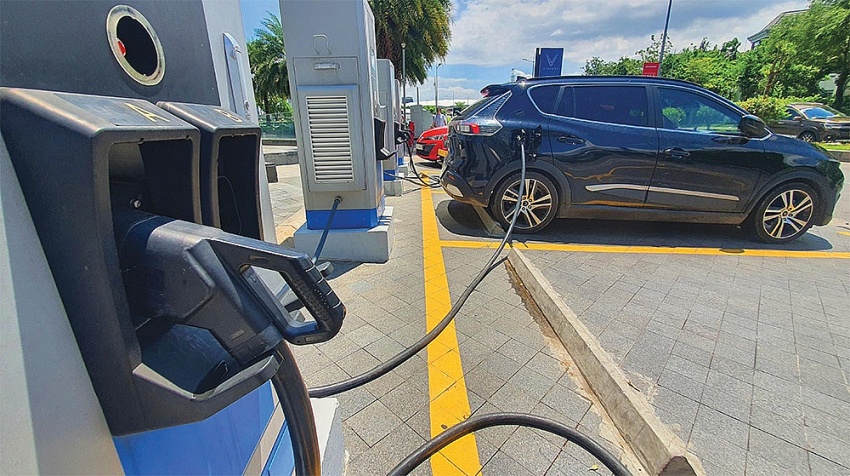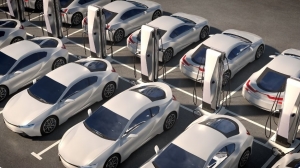New partnerships mooted to enhance e-vehicle prospects
In mid-May, US-based Analog Devices (ADI) announced a partnership with VinFast aimed at advancing battery management system solutions for electric vehicles (EVs) and energy storage systems.
 |
| The competition in electric vehicles and accompanying areas continues to expand, photo Le Toan |
Patrick Morgan, corporate vice president of Automotive and Energy at ADI, said that in recent years, Vietnam’s EV market has seen remarkable growth driven by escalating demand among consumers and global clean energy trends.
“VinFast has spearheaded and contributed to this EV adoption in Vietnam tremendously through its own Vietnamese-made cars. Vietnam’s EV market is expected to surge at more than 25 per cent over the next decade, primarily driven by increasing local production and demand for clean energy vehicles,” Morgan said.
“The country’s favourable investment climate, coupled with its commitment to sustainable energy, makes it an ideal time for ADI to increase our presence in the market. With a population of more than 100 million people, Vietnam’s access to technological expertise and a skilled workforce further enhances its attractiveness as a destination for EV investment and development,” he added.
ADI has been contributing in Vietnam as well as global markets with innovative EV solutions. Recognising Vietnam as one of its fastest-growing markets, ADI sees immense potential in its advancing infrastructure for the semiconductor industry and EV growth.
“These technologies often require advanced and specialised semiconductor components and chips, suggesting significant growth potential in these areas. Looking ahead, we anticipate partnerships to focus on enhancing the EV ecosystem with companies specialising in charging infrastructure, battery technology, and energy storage,” Morgan said.
Mobility is one of Bosch’s core businesses in Vietnam, providing solutions for customers in various areas, including in electrified mobility. Bosch supplies products ranging from hardware and components to integrated and connected software solutions, and even charging services for a wide range of vehicles from heavy-duty and commercial vehicles to passenger cars and motorcycles.
Nguyen Minh Duc, head of Bosch Mobility Vietnam said, “The market for EVs in Vietnam is rapidly increasing in volume in the scooters segment, and soon we will see a similar development in the four-wheeler segment; both of which Bosch is confident to be able to supply and service. Our customers include not only global carmakers located in Vietnam with headquarters in established countries such as Japan, South Korea, Germany, but also local Vietnamese and regional electrification startups.”
With an extensive electrification portfolio leveraging Bosch’s global expertise and development hubs in Vietnam and worldwide, the key task for Bosch Vietnam is to bring the same global expertise and quality solutions to the local market.
“Bosch advocates for our local customers’ needs at global or regional development hubs to ensure our solutions are suitable for the market. We also invest capacity and effort to ensure delivery excellence in the local vehicle making supply chain,” Duc said.
More players join EV landscape
Vietnam’s EV market has gathered steam over the past few years. VinFast started with proprietary solutions, while European EV solution providers ABB, Schneider, and Siemens followed brands Audi, BMW, Mercedes-Benz, and Porsche in Vietnam to supply charging stations to charging network providers such as EV One, eBoost, and Charge+.
Following Kia and Hyundai, South Korean LG Electronics has ramped up EV research and development (R&D) in Vietnam. Samsung SDI supplies batteries to Selex, while SoluM Co., a South Korean medium-sized manufacturer of electronic components, inked a deal with PetroVietnam Power Corporation in 2023 to develop chargers and build battery exchange system stations in Vietnam.
Likewise, battery and charging stations suppliers from China follow Chinese vehicle manufacturers like Wuling, GAC, Chery, Great Wall Motors, BYD, Geely, Lynk & Co, and Omoda & Jaecoo.
Laurent Genet, automotive expert and external advisor at Bain & Company, said the EV industry is here to stay in Vietnam.
“The EV competition, with more brands launching more models, keeps growing. Heavy investment in charging networks will continue despite the small EV car population. The momentum for Vietnamese and foreign companies will stem from business-to-business cooperation, providing parts, components, and services, until the EV business becomes profitable,” Genet said.
The government’s policies and regulations – for instance, the Ministry of Science and Technology recently released 11 EV standards – are challenging as evolving regulations remain complex to comply with or obtain licences, Genet added.
“VinFast’s self-generated EV commercial dominance in Vietnam promotes EV technology, for instance, millions of e-taxis customers experience EVs. Statista forecasts Vietnam will reach one million EVs in 2028 and 3.5 million EVs by 2040. Expanding the public charging network, battery capacity, and range of EVs will boost potential in infrastructure, charging stations, EV services, and technologies,” he said.
EV ecosystem takes shape
Expansion of both foreign and local players should benefit Vietnam’s fledgling EV ecosystem. To speed the development of the ecosystem, ADI’s Morgan suggested that Vietnam’s EV ecosystem requires a comprehensive strategy.
“As the demand for EVs increases, bridging the technology gap and advancing charging infrastructure are crucial steps. This involves investments in charging stations and battery manufacturing, which are pivotal for seamless adoption,” he said.
Additionally, government collaborations with global groups and continuous foreign investment can expedite the ecosystem’s development. Vietnam should also establish supportive policies and regulations to create an environment that encourages growth and innovation. With these measures in place on top of a skilled workforce, Vietnam has the potential to emerge as a significant player in the global EV market.
In the same vein, Duc from Bosch said EV development requires supporting infrastructure, and Vietnam is on the right path to build up an ecosystem for the transition to electrification.
“There are already targets set for carbon neutrality and new energy vehicles, which will facilitate the movement of EV makers. At the very early stage of transition, the introduction of preferential incentives and regulatory frameworks could also motivate both industry players to invest and consumers to adopt EVs as an alternative and sustainable means of transportation,” he said.
In addition, the public and private sectors’ collaboration to address the challenges of EV ecosystem development will accelerate Vietnam’s transition to electric mobility, Duc explained.
To contribute to the development of Vietnam’s EV ecosystem, Bosch Vietnam has established businesses for the sales of original equipment and mobility R&D in Ho Chi Minh City since 2022. The Bosch Global Software Technologies Vietnam has extended its operation in Hanoi, adding up another 500 software engineers and focusing on localised innovation and developing technologies for local market demands.
Meanwhile, automotive expert Genet pointed out some challenges that needed to be addressed to attract companies into the EV ecosystem. “Specifically, the concern about increasing electricity prices must be addressed to increase confidence in usage costs and return on investment. Developing renewable energy sources usable in charging stations will ensure energy security as battery EVs and plug-in hybrids increase in urban areas,” he said.
“Additionally, skilled professionals with expertise in EV technology will be scarce to hire in Vietnam, so educational institutions training specifically for this industry should be supported. EV projects demand sizable long-term capital resources that are difficult to secure from banks. Vietnam’s EVs will only develop via supportive credit, investment, and trade policies for businesses,” Genet said.
 | Electric vehicles gradually proving their superior value Vietnamese private conglomerate Geleximco is partnering with OMODA&JAECOO Automobile to strengthen its business. Tran Hung, marketing manager of the joint venture, talked to VIR’s Bich Thuy about how it will work. |
 | En Vang accelerates shift to electric vehicles After 20 years of building its reputation in Hai Phong's transportation industry, En Vang International JSC is accelerateing the shift from petrol to electric vehicles (EVs). |
 | Electric vehicle growth to accelerate over the longer term A recent Citi Research report sees electric vehicles’ global volume growing modestly this year but after that, it’s pedal to the metal. |
What the stars mean:
★ Poor ★ ★ Promising ★★★ Good ★★★★ Very good ★★★★★ Exceptional
Related Contents
Latest News
More News
- Vietnam, New Zealand seek level-up in ties (February 19, 2026 | 18:06)
- Untapped potential in relations with Indonesia (February 19, 2026 | 17:56)
- German strengths match Vietnamese aspirations (February 19, 2026 | 17:40)
- Kim Long Motor and AOJ Suzhou enter strategic partnership (February 16, 2026 | 13:27)
- Haiphong welcomes long-term Euro investment (February 16, 2026 | 11:31)
- VIFC in Ho Chi Minh City officially launches (February 12, 2026 | 09:00)
- Norfund invests $4 million in Vietnam plastics recycling (February 11, 2026 | 11:51)
- Marico buys 75 per cent of Vietnam skincare startup Skinetiq (February 10, 2026 | 14:44)
- SCIC general director meets with Oman Investment Authority (February 10, 2026 | 14:14)
- G42 and Vietnamese consortium to build national AI infrastructure (February 09, 2026 | 17:32)

 Tag:
Tag:




















 Mobile Version
Mobile Version